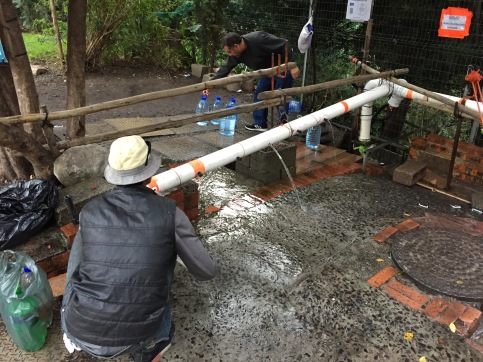
Day zero has been a central thought in conversations surrounding the beloved mother city, but what will happen once Cape Town residents are actually required to queue for their water? I decided to take a closer look at the collection points, with specific reference to the point in Newlands village, and how they are being managed to ensure security and efficiency, ultimately looking at whether the approach towards water-collection in preparation for day zero is the most practical and effective method of water-rationing.
In early January of this year, the City of Cape Town announced that 200 collection points (also referred to as ‘pods’) will be activated and distributed to service the entire Cape Town population, which is nearly 4 million people, with as little as 25 litres being allocated for each individual per day. These statistics show alarming signs and raise questions over how such inevitably long queues can be managed with organization.
What about the elderly? Pregnant women? The condition (shade, safety, parking space, toilets etc.) of collection points? Well, the mayoral committee member for safety and security of Cape Town, Jean-Pierre Smith revealed that organisations have already approached city officials, who are now working together to organize bulk delivery to old-age homes as well as those more vulnerable in townships, for example. Furthermore, the city has ensured that through the certainty of extremely long queues, systems will be installed to provide sufficient shade, giving preference to pregnant women and the elderly in queues. Pods will also be well equipped with sanitary and refuse services. Such systems are in place to ensure that no matter how unpleasant the queuing will of course be, the disaster is to be addressed steadily, without trouble.
So, if the city has done their research and organised systemps to be put in place, what does the current state of the Kildare Road spring collection point tell us about the success of the current collection-point situation?
Living so near to the Newlands spring in Springs way just off Kildare road, I am able to easily hear the constant chatter by those waiting throughout the night. Just a few months ago, there were reports of a gun being fired on Springs Way which was very unnerving for all residents close to the spring. So, when Day zero arrives and there is even more pandemonium, is comprehensive safety to all those collecting possible?
Here is a short clip of the actual collection station, showing how the water is distributed from various taps to increase efficiency:
When visiting the spring a couple of weeks ago, I had a short conversation with two South African Police Services officer, who interestingly (and unfortunately so), revealed that they were not allowed to be recorded or disclose their names. Despite this, I took some mental notes of the conversation I had and received interesting information.
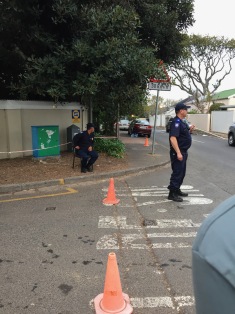
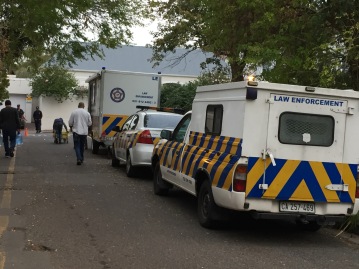
These images show the strong presence of the law enforcement at the small Newlands pod, with the two policemen I spoke two in the left image, who were both reluctant to have their photos taken.
I asked the officers what their biggest challenges were in monitoring the pod and whether they experienced troubles with individuals on a regular basis. Apparently, a day without someone misbehaving, which includes stealing other people’s recently collected water to behaving angrily at other residents as well as policemen, along with many other instances. Such instances make the management process much more difficult to control, as well as making the pod environment less secure and more chaotic. Interestingly, the one officer stated that the whole idea of ‘day zero’ has made the implementation of water-collection systems more frantic.
“The city has created its own crisis”, the one officer said.
Without being able to quote any further, the conversation that followed revealed that both officers were in agreement in that the disorder caused by the ‘day zero’ announcement has made the management of pods a much bigger challenge.
After that same visit to the spring a few weeks ago, I had a brief conversation with Kildare Road resident, Rosemary Bell. I asked her how the constant queues and noise-presence, with reference to the management of the spring, has affected the local community.
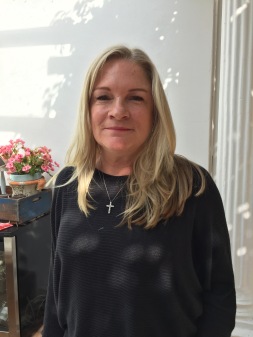
Water scarcity affects every South African, so this crisis has the potential to unite us. While it is true that the atmosphere within the queues at collection points may be collaborative and communal, it is clear that for residents like Rosemary, where one disagrees or disagrees with her sentiments, the lack of management at sites by The City of Cape Town, with regard to noise, refuse and sanitation at particular pods, has had an adverse and negative impact, causing the riff between communities to grow larger.
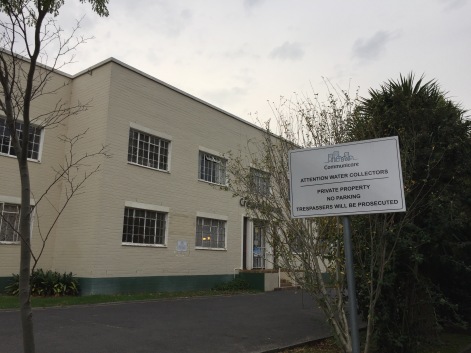
The spring just off Kildare road has been planned to switch locations [as the picture below illustrates], however the 9th of May has passed, with very little information being provided as to when and if the pod will actually relocate.
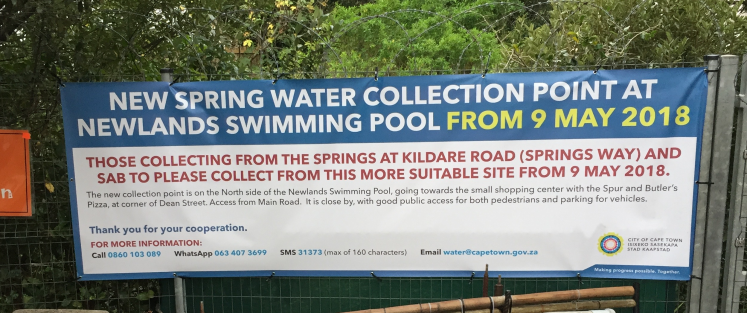
This sign spreading a message which has evidently not been implemented, emphasises how the water-collection system is currently not meeting the standards required to ensure sustainable and more efficient water-rationing. More research is essential to find rationing methods that are able to ensure the unity of all Cape Town residents. The crisis that we will inevitably all have to face will be a huge challenge for everyone affected by it. However, it is a challenge that can easily be overcome through the unification and co-operation of all people. While the collection points have been prepared in such a way to cater for all needs, executing them properly is an entirely different prospect, and it is up to us, in collaboration with the officials in charge of the project to ensure we can claw our way out of this crisis, with greater knowledge and motivation to never be faced with such a crisis again.